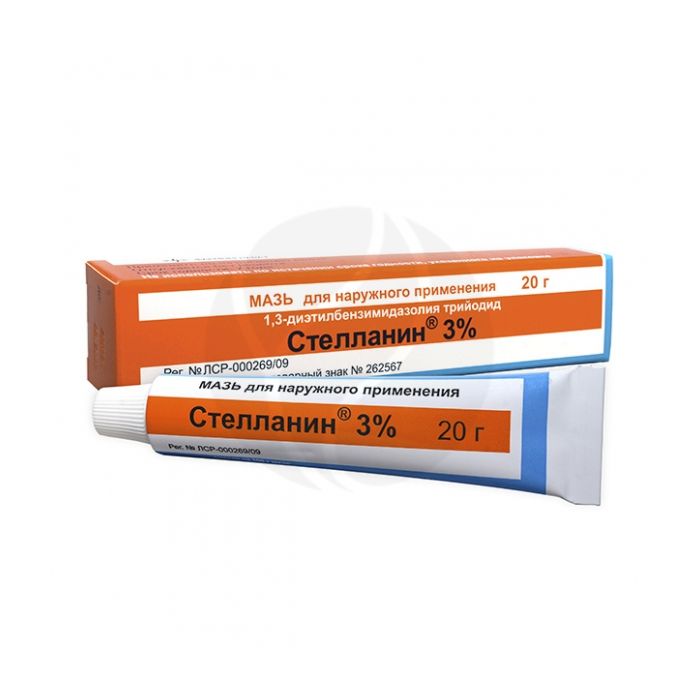Stellanin ointment 3%, 20 g
Russian Pharmacy name:
Стелланин мазь 3%, 20 г
trophic ulcers of the lower extremities;
bedsores;
burns of I and II degrees;
abrasions, cuts, scratches, cracks, scratches, including after insect bites;
additional treatment of aseptic postoperative wounds (after excision, coagulation, episiotomy, for the treatment of skin cracks, wounds and stitches);
acceleration of engraftment of a skin graft.
Outwardly.
The drug is applied to the damaged skin surface so that the skin area is completely covered with the drug. The duration and frequency of application of the drug depends on the severity of the disease and the localization of the process. The daily dose should not exceed 10 g. It is possible to use occlusive dressings and a patch.
When treating fanulating burns, wounds and trophic ulcers with weak exudation, the drug is applied in a uniform layer 1.0-1.5 mm thick so that the entire affected surface is covered with ointment, and a sterile gauze bandage is applied. Dressings are changed once every 1-2 days in the treatment of burns and 1-2 times a day in the treatment of wounds and trophic ulcers. With an open method of treating burns, the drug is applied 1-2 times a day. The duration of treatment is determined by the dynamics of wound epithelialization. For minor skin lesions (abrasions, cuts, scratches, cracks, scratches), the drug is applied in a thin layer to the affected surface 2 times a day.
Active ingredient: 1,3-diethylbenzimidazolium triiodide -3.0 g
Excipients: povidone (low molecular weight polyvinylpyrrolidone) - 1.5 g, dimexide - 4.5 g, glycerol (glycerin) - 5.0 g, petrolatum - up to 100 g ...
Hypersensitivity to the components of the drug, thyrotoxicosis, thyroid adenoma, renal failure, simultaneous therapy with radioactive iodine, children under 18 years of age, I trimester of pregnancy.
Carefully
Chronic renal failure, II and III trimesters of pregnancy, lactation.
Tradename:
StellaninЃ
Chemical name:
1,3-diethylbenzimidazolium triiodide
Dosage form:
Ointment for external use
Composition per 100 g of ointment:
Active substance: 1,3-diethylbenzimidazolium triiodide -3.0 g
Excipients: povidone (low molecular weight polyvinylpyrrolidone) - 1.5 g, dimexide - 4.5 g, glycerol (glycerin) - 5.0 g, petrolatum - up to 100 g ...
Description:
Dark brown ointment with a weak characteristic odor
Pharmacotherapeutic group
Tissue regeneration stimulant
Pharmacological properties:
Pharmacodynamics
The active component of Stellanin is 1,3-diethylbenzimidazolium triiodide. The mechanism of the pharmacological activity of the drug lies in the direct regenerative action of 1,3-diethylbenzimidazolium on damaged skin. Active iodine, which is part of the drug, inactivates the proteins of the bacterial wall and enzyme proteins of bacteria, thereby providing a bactericidal effect.
Stellanin protects the surface of the wound from infections, suppresses the course of the infectious process and promotes healing.
Pharmacokinetics
Systemic absorption of the active substance is absent even with damaged skin, however, therapeutic concentrations of the drug are present in the wound.
Indications for use:
trophic ulcers of the lower extremities;
bedsores;
burns of I and II degrees;
abrasions, cuts, scratches, cracks, scratches, including after insect bites;
additional treatment of aseptic postoperative wounds (after excision, coagulation, episiotomy, for the treatment of skin cracks, wounds and stitches);
acceleration of engraftment of a skin graft.
Contraindications
Hypersensitivity to the components of the drug, thyrotoxicosis, thyroid adenoma, renal failure, simultaneous therapy with radioactive iodine, children under 18 years of age, I trimester of pregnancy.
Carefully
Chronic renal failure, II and III trimesters of pregnancy, lactation.
Method of administration and dosage:
Outwardly.
The drug is applied to the damaged skin surface so that the skin area is completely covered with the drug. The duration and frequency of application of the drug depends on the severity of the disease and the localization of the process. The daily dose should not exceed 10 g. It is possible to use occlusive dressings and a patch.
When treating fanulating burns, wounds and trophic ulcers with weak exudation, the drug is applied in a uniform layer 1.0-1.5 mm thick so that the entire affected surface is covered with ointment, and a sterile gauze bandage is applied. Dressings are changed once every 1-2 days in the treatment of burns and 1-2 times a day in the treatment of wounds and trophic ulcers. With an open method of treating burns, the drug is applied 1-2 times a day. The duration of treatment is determined by the dynamics of wound epithelialization. For minor skin lesions (abrasions, cuts, scratches, cracks, scratches), the drug is applied in a thin layer to the affected surface 2 times a day.
Side effect:
In rare cases, allergic skin reactions (itching, flushing of the skin) are possible, in the event of which the drug should be discontinued.
Overdose
Overdose cases are not described. In case of accidental ingestion of the drug inside, nausea and vomiting may occur. It is necessary to flush the stomach and consult a doctor, if necessary, symptomatic treatment is carried out.
Interaction with other medicinal products:
The drug should not be used in combination with other antiseptic agents containing mercury, oxidants, alkalis and cationic surfactants. In the presence of blood, the bactericidal effect of the drug may decrease.
special instructions
The ointment should not be applied to mucous membranes. If the drug gets into the eyes or on the mucous membrane, rinse with warm water.
Release form:
Ointment for external use 3%.
20 g in aluminum tubes together with instructions for use in cardboard packs.
Storage conditions:
In a dry, dark place at a temperature of 0-25 ? C.
Keep out of the reach of children.
Shelf life:
2 years.
Do not use after the expiration date printed on the packaging
Terms of dispensing from pharmacies:
On prescription.

